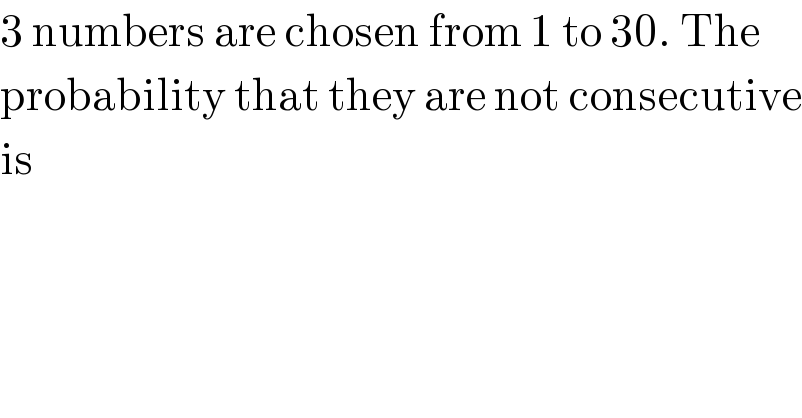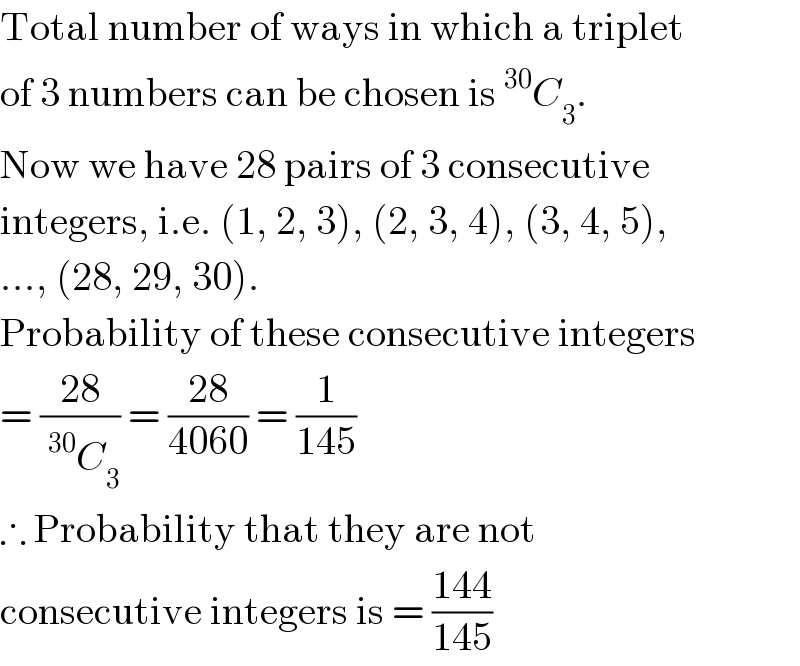
Question Number 18464 by chernoaguero@gmail.com last updated on 22/Jul/17

$$\mathrm{3}\:\mathrm{numbers}\:\mathrm{are}\:\mathrm{chosen}\:\mathrm{from}\:\mathrm{1}\:\mathrm{to}\:\mathrm{30}.\:\mathrm{The} \\ $$$$\mathrm{probability}\:\mathrm{that}\:\mathrm{they}\:\mathrm{are}\:\mathrm{not}\:\mathrm{consecutive} \\ $$$$\mathrm{is} \\ $$
Answered by Tinkutara last updated on 22/Jul/17

$$\mathrm{Total}\:\mathrm{number}\:\mathrm{of}\:\mathrm{ways}\:\mathrm{in}\:\mathrm{which}\:\mathrm{a}\:\mathrm{triplet} \\ $$$$\mathrm{of}\:\mathrm{3}\:\mathrm{numbers}\:\mathrm{can}\:\mathrm{be}\:\mathrm{chosen}\:\mathrm{is}\:^{\mathrm{30}} {C}_{\mathrm{3}} . \\ $$$$\mathrm{Now}\:\mathrm{we}\:\mathrm{have}\:\mathrm{28}\:\mathrm{pairs}\:\mathrm{of}\:\mathrm{3}\:\mathrm{consecutive} \\ $$$$\mathrm{integers},\:\mathrm{i}.\mathrm{e}.\:\left(\mathrm{1},\:\mathrm{2},\:\mathrm{3}\right),\:\left(\mathrm{2},\:\mathrm{3},\:\mathrm{4}\right),\:\left(\mathrm{3},\:\mathrm{4},\:\mathrm{5}\right), \\ $$$$...,\:\left(\mathrm{28},\:\mathrm{29},\:\mathrm{30}\right). \\ $$$$\mathrm{Probability}\:\mathrm{of}\:\mathrm{these}\:\mathrm{consecutive}\:\mathrm{integers} \\ $$$$=\:\frac{\mathrm{28}}{\:^{\mathrm{30}} {C}_{\mathrm{3}} }\:=\:\frac{\mathrm{28}}{\mathrm{4060}}\:=\:\frac{\mathrm{1}}{\mathrm{145}} \\ $$$$\therefore\:\mathrm{Probability}\:\mathrm{that}\:\mathrm{they}\:\mathrm{are}\:\mathrm{not} \\ $$$$\mathrm{consecutive}\:\mathrm{integers}\:\mathrm{is}\:=\:\frac{\mathrm{144}}{\mathrm{145}} \\ $$
